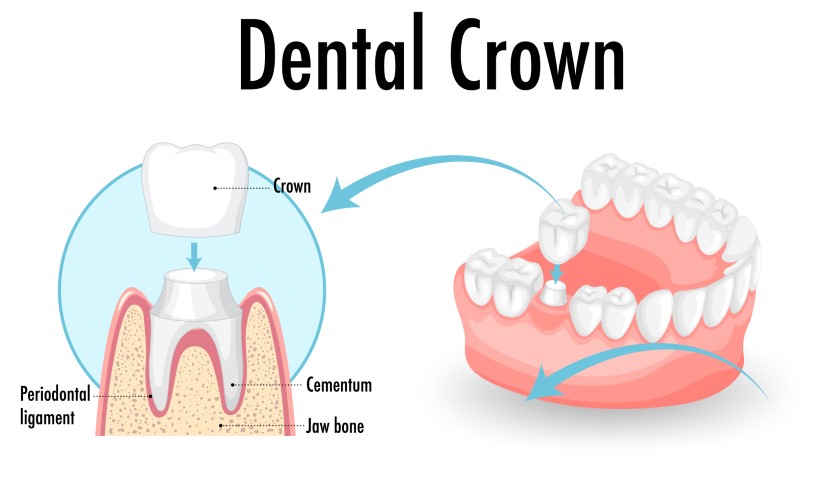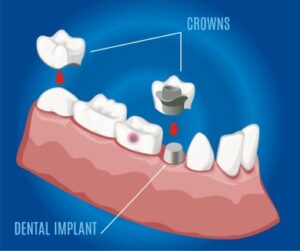What is a Dental Crown?
A dental crown is a “tooth cap” that is placed over a damaged, decayed, or weakened tooth to restore its shape, size, strength, and appearance. Crowns are custom-made to fit over the affected tooth and can be made from a variety of materials, including porcelain, ceramic, metal, or a combination of these materials. They protect and restore the tooth’s functionality.
We also offer Full arch reconstruction or full mouth rehabilitation which are the use of multiple crowns (and bridges) to restore your worn & missing teeth back to what they should be like!
Signs you might need a tooth cap
Crowns are an excellent solution for teeth that are weak and require some sort of strengthening or improved aesthetics. They are usually recommended when one of the following
happens:
- Fractured or cracked teeth
- Loss of tooth structure due to decay
- Heavily filled (large tooth filling) and hence weak underlying tooth structure
- Aesthetic concerns (such as discolouration)
- The tooth has had a root canal (and is hence extremely weak)
- Restoration of a dental implant (tooth on an implant)

What type of materials do you use for a dental crown?
Dental Caps can be made out of the following materials:
- Monolithic Zirconia (Ceramic) – Zirconia has excellent compressive strength and wear ratings.
- Lithium Disilicate (Ceramic) – This ceramic material (also known as E.max) is extremely popular due to it’s aesthetics and ability to be bonded onto teeth.
- Porcelain fused to Metal (PFM) – The traditional way to make crowns and bridges, with excellent long-term studies to prove its reliability.
- Porcelain fused to Zirconia (PFZ) – A fusion of the traditional way to bond porcelain using a new-age ceramic as the strong base.
- Gold and metal alloys – All metals have excellent compressive strength and wear ratings. These are the material of choice in heavy teeth grinders.
- Stainless Steel Crowns – These pre-formed crowns are primarily used in children, allowing us to effectively restore large teeth decay and teeth with pulpotomies.
Teeth Crowning procedure
The steps for a successful dental crown are as follows:
- A full comprehensive oral examination is performed and all your teeth are checked for problems.

- All teeth problems such as cavities, infections and gum disease are all fixed prior to the crowning process.
- For a dental crown on teeth:
- The tooth is prepared (adjusted) and moulds or 3D scans are taken and sent to our local dental lab.
- Your new custom tooth cap is either milled or constructed and sent back to us in roughly two weeks.
- Your new dental crown is bonded onto your teeth.
- For a dental crown on a dental implant:
- The implant connection is exposed and 3D scans or impressions are taken and sent to our local dental lab.
- Your new custom implant crown is either milled or constructed (or both!) and sent back to us in roughly three weeks.
- Your new implant crown is screwed onto your implants.
- For a Stainless Steel Crown on Children:
- Hall Crown technique: We place separators are between teeth and a few days later, a pre-formed crown is cemented over the top of the tooth.
- Sealing Pulpotomies: The tooth is prepared just like an adult tooth and a pre-formed crown is cemented over the top of the tooth.
Possible complications
As with any dental treatment, some patients may experience complications such as sensitivity. Nerve death and a subsequent need for a root canal occurs in roughly 10-20% of crown and bridge cases. This is mainly due to the fact that when teeth require a crown, it is already fairly broken down due to decay or cracks. Others may experience porcelain chipping or even porcelain fracture. In such cases, repair is not possible and replacement of the crown may be required. Teeth not immune to decay even with a crown and hence we recommend that to check and clean it on a regular basis. Patients who grind their teeth still require a night splint to protect their dental crowns. All dental restorations have a limited life-span and will require eventual replacement.
Interested in Dental Crowns?
Contact us now on (03) 8899 6331 or check out our other services here.
Book Online
Need help with your dental payments?
We have a variety of Payment Plans available – giving you the flexibility of paying for your Dental Crown later.
Payment PlansFrequently Asked Questions
How long do tooth crowns last?
Crowns can last around 7–15 years according to studies however there are many variables including oral hygiene and grinding.
How do I clean my new crown?
The best way to clean a tooth cap is to brush and floss it normally - treating it like a normal tooth. If floss is not available, we recommend the use of a water-flosser to remove debris.

